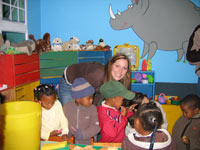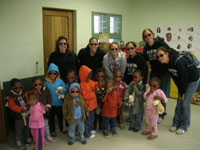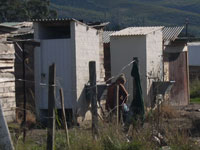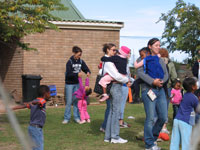UF Teaching Students See Different Side of New South Africa
July 17, 2006
Sources:
Catherine Tucker, (352) 359-1258; mctucker917@hotmail.com
Tom Dana; (352) 392-9191, ext. 226; tdana@coe.ufl.edu
Jacqueline Gonzalez, UF ProTeach student, (305) 401-7906
Jeff Kearney, UF ProTeach student, (352) 871-0468
University of Florida student Jacqueline Gonzalez just traveled 8,000 miles to spend part of her summer in schools with sporadic electricity and only a handful of books.
It’s not what normally comes to mind when you hear the words “study abroad,” but Gonzalez couldn’t be happier.
“I didn’t just want to experience another culture, I wanted to make a difference.” said Gonzalez, a student in the UF’s College of Education. “I think I learned even more than I was able to teach.”

ProTeach student Kara Gosnay works with children at the Coldstream Creche in rural South Africa in this June, 2006 photograph.
Gonzalez is one of a dozen UF education students who spent six weeks in poor and rural areas of South Africa, teaching and doing repairs in schools that are makeshift and underfunded – and incredibly valuable to the communities they serve. All 12 students are enrolled in the College of Education’s Elementary ProTeach program, an intensive, five-year course of study for future elementary school teachers.
The UF program took students beyond the bustling, modern landscape of Cape Town and into townships and rural areas where South Africa’s famous prosperity is little more than a rumor.
“It’s true that South Africa is probably the richest country in Africa,” said Catherine Tucker, a doctoral student in counselor education, who organized and led the trip. “You do see a lot of prosperity in the cities – but you don’t have to go far to see that this is still a Third World country.”

ProTeach students pose with children from the Coldstream Creche. The UF students delivered supplies donated to the underfunded school, including books, toothbrushes – and, for fun, sunglasses.
ProTeach students taught beginning English to children at four schools in Kurland and Coldstream, two small towns in South Africa’s Eastern Cape Province. Many of the province’s poorest residents are multilingual, speaking Afrikaans and tribal languages, but not English. They are effectively shut out of jobs in the country’s fast-growing, and largely English-speaking, tourist industry.
“Six weeks is not a long time to study English, but young children have an amazing ability to pick up new languages,” Tucker said. “If they remember even a few phrases as adults, this could help them find jobs in tourism.”
Students also made physical improvements to the schools, planting gardens, painting walls and distributing school supplies they brought with them.
“It’s kind of hard to imagine a preschool without crayons or books, but we did see that,” said ProTeach student Jeff Kearney. “On a trip like this, you realize just how much we take for granted in the U.S.”

Outhouses are a common feature of homes in Kurland, one of two South African villages where COE students recently spent six weeks working in local schools.
While UF students didn’t learn Afrikaans as quickly as their young charges picked up English, they learned something that may have been even more valuable – the ability to reach across a cultural divide.
“We found out that there are quite a few ways to communicate without knowing the language,” Kearney said. “You can say a lot with gestures and body language. You can even teach some basic English.”
The College of Education is preparing to significantly expand study abroad opportunities for its students. The college currently offers an optional study experience in Costa Rica associated with a course in Global Studies, and is working to establish for-credit study abroad projects in several countries, including Costa Rica and England. The college is mulling the creation of an international education minor for undergraduates, which would likely consist of 15 hours of courses in international education, including up to six hours of courses taken overseas.
“Studying abroad dramatically increases a teacher’s inter-cultural competency, which can help them if they’re teaching children from another part of the country, or from the other side of the tracks,” said Tom Dana, director of the School of Teaching and Learning, which hosts ProTeach. “Culture affects even the simplest things you do – like how you walk down a sidewalk or drive a car.”

COE students play with children at Crags Primary School in Kurland.
Like Englishmen driving in America, children from other cultures often unintentionally break cultural rules in U.S. classrooms, Dana said. When teachers study abroad, he said, they learn how it feels to be the one perpetually on the wrong side of the road.
A trip overseas can also deepen a teacher’s understanding of the subject he or she will teach, said Theresa Vernetson, assistant dean for student affairs at the college.
“Study abroad is particularly useful if you’re teaching history or social science,” she said. “Seeing these places and customs first-hand can give you more confidence with the subject matter.”
Even the impoverished schools of rural South Africa hold lessons for teachers in the U.S. Faced with daunting social problems and a lack of resources, Tucker said, students quickly learn to be resourceful.
“Teachers in South Africa deal with fetal alcohol syndrome, AIDS, tuberculosis, huge class sizes and other Third World problems,” Tucker said. “Imagine how easy your first teaching job in the U.S. is going to look after that.”
By: Tim Lockette, (352) 392-0726 ext. 274; lockette@coe.ufl.edu




